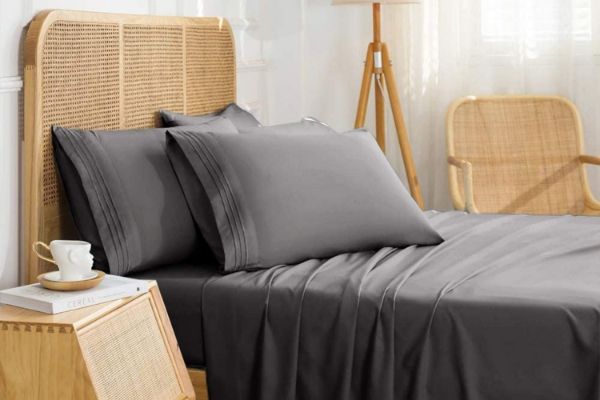A good night’s sleep is crucial for our health and well-being, but for some people, allergies can make it difficult to achieve. The good news is that there are hypoallergenic bed sheets available that can help alleviate allergy symptoms and provide a more comfortable and restful sleep.
In this article, we will explore what hypoallergenic bed sheets are, how they work, the factors to consider when choosing them, the benefits of using them, and how to maintain them.

Table of Contents
What are Hypoallergenic Bed Sheets?
Hypoallergenic bed sheets are made of materials that are less likely to cause allergic reactions in people with sensitive skin or allergies. These materials can include cotton, bamboo, silk, and microfiber, and are often treated with special processes that remove allergens such as dust mites, pet dander, and pollen.
Hypoallergenic bed sheets are designed to prevent the buildup of allergens that can cause sneezing, itching, and other allergic reactions, allowing for a more comfortable and restful sleep.
Factors to Consider When Choosing Hypoallergenic Bed Sheets
When choosing hypoallergenic bed sheets, several factors should be considered to ensure optimal performance. Firstly, the material used should be breathable and lightweight, allowing air to circulate freely and reducing the buildup of heat and moisture.
Secondly, the thread count is another critical factor that affects the quality and durability of the sheets. A higher thread count usually means that the sheets are softer and more durable, but it can also affect their breathability.
Thirdly, the weave of the sheets is also important, as it can affect how well the sheets absorb moisture and how quickly they dry. Lastly, it is essential to choose sheets that are easy to care for and maintain.
Benefits of Using Hypoallergenic Bed Sheets
Using hypoallergenic bed sheets can provide several benefits, including improved sleep quality, reduced allergy symptoms, and increased comfort. Hypoallergenic bed sheets can prevent the buildup of allergens that can cause sneezing, itching, and other allergic reactions, providing a more comfortable sleeping experience.
They can also be beneficial for people with sensitive skin, as they are less likely to cause irritation or breakouts. Additionally, hypoallergenic bed sheets can be more durable than regular sheets, making them a smart investment for people who want long-lasting, high-quality bedding.
Maintenance of Hypoallergenic Bed Sheets
It is essential to care for and maintain hypoallergenic bed sheets properly to ensure their longevity and effectiveness. Most hypoallergenic bed sheets can be machine washed, but it is important to follow the care instructions provided by the manufacturer.
Avoid using fabric softeners or bleach, as they can damage the hypoallergenic properties of the sheets. It is also recommended to wash the sheets in hot water to kill any remaining allergens and bacteria.
Conclusion
Hypoallergenic bed sheets can be a game-changer for people who suffer from allergies or have sensitive skin. By preventing the buildup of allergens and providing a more comfortable and restful sleep, hypoallergenic bed sheets can improve overall sleep quality and promote better health and well-being.
When choosing hypoallergenic bed sheets, it is important to consider factors such as material, thread count, weave, and ease of care to ensure optimal performance. With the right care and attention, hypoallergenic bed sheets can provide years of comfortable and healthy sleep.

Alex P. Davis has a BA in Interior Design from The New York School of Interior Design and 10 years of experience expertly designing sophisticated interiors.
